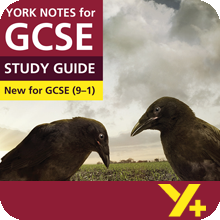Examiner's Notes
You assessed this answer as Grades 6–7.
Hover over the highlighted text to read the examiner’s comments.
Question: ‘He announced that, by special decree of Comrade Napoleon, “Beasts of England” had been abolished. From now onwards it was forbidden to sing it.’
Explain how the song ‘Beasts of England’ is important in Animal Farm.
You must refer to the context of the novel in your answer.
The song ‘Beasts of England’ is important to Animal Farm, as Orwell uses it to represent the key ideas of Animalism – equality, freedom and unity. At the beginning of the novel, the song is often sung to bring the animals together. However, as the novel progresses and the power balance shifts in favour of the pigs, the song comes to be seen as a threat to Napoleon’s power and is banned by his regime. The song represents how the ideals of communism were quickly suppressed in the Russian revolution.
‘Beasts of England’ is first sung in Chapter 1 by Old Major, when he remembers the words of the song from his dream. This gives the song importance as it is part of the original dream of Animalism, as the song is about escaping different forms of oppression from ‘Tyrant Man’.
Orwell initially uses the song to symbolise unity and the sense of community at the farm. The song is sung at key events in the farm’s development – for example, the animals sing it seven times following the rebellion, at the end of every meeting and after the Battle of the Cowshed. This repeated use reminds us of the importance of unity and collaboration at the farm. The song even spreads to neighbouring farms, and it becomes an important symbol of Animalism and freedom.
However, as the novel develops and power is monopolised by the pigs, led by Napoleon, the song becomes a threat to their leadership, as it symbolises a time of equality and freedom. As Napoleon’s power grows, he controls the animals by removing many of the original traditions of Animalism: the meetings are abolished, the song is banned and the pigs amend the commandments to suit their new ideology. This abuse of power is shown when the animals sing the song ‘slowly and mournfully’ one last time after the executions in Chapter 7, as if they are grieving for their rights and freedom as well as the animals who have been executed.
The banning of the song reflects how Stalin corrupted the ideals of communism in his regime, in the same way that the pigs do at the farm. Squealer’s statement that ‘Beasts of England’ is no longer needed, because the ‘better society’ that it sings about has now been established is ironic, as the animals are suffering in the same ways as they did before the rebellion. This foreshadows the end of the novel, when the pigs become indistinguishable from humans.
The final time that ‘Beasts of England’ is sung is in Chapter 8, when the pigs are drunk and sing it loudly in the farmhouse. This seems to make a mockery of the song and all it stands for, showing how little respect the pigs have for the other animals and their beliefs.
By the final chapter, the song is only a distant memory for the animals on the farm. The tune ‘was perhaps hummed secretly here and there’ but the animals are afraid to sing it out loud. Orwell shows how different their lives are now compared with the original idealism of Animalism, suggesting the same about Stalin’s communist Russia. The animals appear naive here, as they still believe in the dream of Animal Farm and think they are better off, as they are not being oppressed by ‘tyrannical human beings’. They seem unable to understand the oppressive regime that they are living under.
The song is an important part of Animal Farm as Orwell uses it to trace the decline of the animals’ rights and freedoms. Orwell’s allegory shows us that, while communism might promote the ideals of equality, freedom and unity, the reality of implementing them is very different. Power can easily be corrupted, and in communist Russia the outcome of this was an unequal society and a totalitarian regime.
